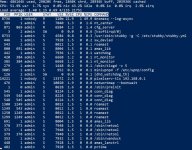ChickenMilk
New Around Here
At least once a day (usually more) on my AC3100 (386.7) for about 15-30 minutes dnsmasq starts using high CPU and causes it to be non responsive. Causing panic in the house.
It's been happening for the last couple of versions (I think since 386).
I am currently using Diversion with Pixelserv and Skynet. Also have DNS Rebind Protection, DNSSEC and DNS Over TLS Using cloudflare turned on.
Has anyone else experienced this? How can I go about troubleshooting it?
See attached pic for when dnsmasq become unresponsive.
It's been happening for the last couple of versions (I think since 386).
I am currently using Diversion with Pixelserv and Skynet. Also have DNS Rebind Protection, DNSSEC and DNS Over TLS Using cloudflare turned on.
Has anyone else experienced this? How can I go about troubleshooting it?
See attached pic for when dnsmasq become unresponsive.

